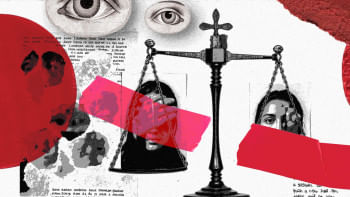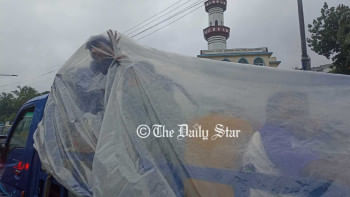The Sagar-Runi case and Bangladesh’s crisis of justice

Thirteen years is a long time to wait for justice. In most places of the world, that kind of delay would be an anomaly. In Bangladesh, it's become a routine. On May 21, a Dhaka court quietly extended the deadline for the investigation report in the murder of journalist couple Sagar Sarowar and Meherun Runi—for the 118th time. The new deadline is July 8, and few expect it to stick. The case has become less of a legal proceeding and more of a national metaphor for institutional decay, political obstruction, and a state still struggling to break out of its past.
The couple—he a news editor at Maasranga Television, she a senior reporter with ATN Bangla—were killed in their home in February 2012, stabbed to death while their child, just five years old at the time, was in the next room. The crime shocked the nation. It should have shocked the system into action, too. But 13 years on, the case remains unsolved, the culprits unpunished, and the consequences unresolved.
This isn't just another cold case. It's something else entirely—a symbol of how deep the rot runs, and how hard it will be for the interim government led by Prof Muhammad Yunus to convince people that real reform is even possible.
When Yunus stepped into the role of chief adviser in the wake of the political upheaval in August last year, he did so on the strength of a promise: fundamental reform. Not just a new government, but a new kind of governance. He spoke of irreversible change. More than nine months later, the Sagar-Runi case is still stuck. This is important, because a failure like this tells people more than speeches or policy proposals ever can.
The history of this case reads like a catalogue of missteps. Initial investigations were fumbled, passed between agencies like a burden no one wanted. First, the local police, then the Detective Branch, then the Rapid Action Battalion (Rab)—none of them got close to solving it. More than a hundred extensions later, there's still no conviction, no clear suspect, not even a timeline that makes sense. Along the way, key evidence was destroyed, including—most recently—in a fire at a police office.
Earlier this year, the case took another turn. The family's lawyer accused high-level officials from the previous government of actively obstructing the investigation. That lines up with what UN human rights observers have been saying since 2022: that Bangladesh suffers from a "pervasive culture of impunity," where political connections act like shields against scrutiny. If those allegations are even partly true, it raises difficult questions—not just about the past, but about how much has changed under this new administration.
To be fair, the interim government hasn't entirely ignored the case. A task force was formed in October last year, including members from the Police Bureau of Investigation, the CID, and even Rab, although they had already been removed from leading the probe. The team has interviewed over 70 people, including a range of former officials. That's more effort than we have seen in years. But even so, there's a sense that the clock is ticking louder than ever.
In April, when investigators told the court they needed nine more months, they were granted just six. That decision reflects a growing impatience on the part of the judiciary, the public, and especially the press. Every delay chips away at confidence. Every missed deadline reaffirms a painful truth: that, sometimes, justice in this country is more political than procedural.
And there's a broader context here. Prof Yunus came to power not through an election, but through what's been called a "Monsoon Revolution." The movement that swept Sheikh Hasina's government out of office was driven by popular frustration with corruption, authoritarianism, and the sense that institutions had become hollowed out. The new administration's legitimacy hinges on the idea that things are different now. But how different, exactly? The continued stagnation of the Sagar-Runi investigation raises uncomfortable doubts.
If the interim government can't resolve this case—one that stands as a touchstone for press freedom, justice, and accountability—what does that say about its ability to reform anything else? This isn't just another file on a dusty desk; it's a test case for the government.
Some of the hurdles are real. The crime scene was reportedly contaminated hours after the murders, with journalists and onlookers trampling over key evidence, according to the case investigators. The DNA evidence recovered is partial and inconclusive. These aren't small issues, but they don't fully explain why 13 years have passed without answers. They don't explain the lost documents, conflicting timelines, or the inertia that has followed this case like a shadow.
There's a lesson here that goes beyond forensics or bureaucratic reform. For Bangladesh to truly move past the Hasina era—or any era defined by unchecked executive power—it has to deal honestly with its ghosts. That means confronting cases like this one head-on, without delay and compromise. Anything less risks repeating the cycle.
For journalists still working in the country, the message is chilling. The Sagar-Runi case isn't ancient history; it's a daily reminder that their safety is negotiable, their profession vulnerable. And for ordinary citizens, the case underlines something more basic: that justice, when delayed this long, can start to look like denial.
There are still a few weeks before the new deadline. Maybe something will finally move. Maybe the 119th time will be different. But hopes are thin, and patience is thinner. A revolution, no matter how well-intentioned, can't rely on symbolism alone. It has to deliver—not just policy, not just vision, but results.
Until then, the legacy of Sagar Sarowar and Meherun Runi remains suspended in time, like their case file, like the trust of a nation still waiting for proof that justice doesn't only belong to the powerful.
Md. Ibrahim Khalilullah is vice-president of Bangladesh Law Alliance. He can be reached at [email protected].
Views expressed in this article are the author's own.
Follow The Daily Star Opinion on Facebook for the latest opinions, commentaries and analyses by experts and professionals. To contribute your article or letter to The Daily Star Opinion, see our guidelines for submission.

 For all latest news, follow The Daily Star's Google News channel.
For all latest news, follow The Daily Star's Google News channel. 










Comments